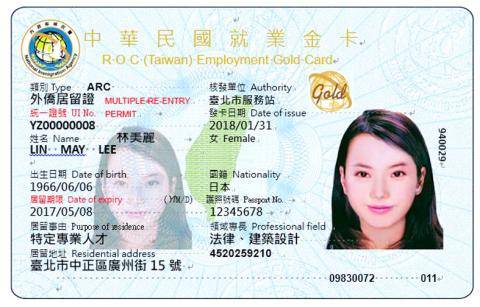《TAIPEI TIMES》 Pandemic success draws foreigners
2021/02/13 03:00
A sample Employment Gold Card issued by the Ministry of the Interior’s National Immigration Agency. Screen grab from the Internet
GOLD CARD HOLDERS: Taiwan’s ‘safety’ and ‘normality’ while many countries have adopted lockdown measures have become reasons for moving here, foreigners said
/ Staff writer, with CNA
The number of recipients of Taiwan’s employment gold card, a special work and residency permit for highly skilled foreign workers, surged last year, reflecting the nation’s attractiveness as a safe haven amid the COVID-19 pandemic.
Official figures showed that last year, 1,399 foreign nationals received the card that serves as a work permit, resident visa, alien resident certificate and re-entry permit.
That represented a sharp increase from 358 in 2019 and 188 in 2018, the year when the National Development Council launched the Employment Gold Card system to attract foreign professionals.
The Gold Card system is open to foreign workers in the fields of science and technology, education, arts and culture, sports and economics, as specified in the Act for the Recruitment and Employment of Foreign Professionals (外國專業人才延攬及僱用法), which took effect on Feb. 8, 2018.
It has since been expanded to cover the fields of finance, architecture and law, said the Taiwan Gold Card Office, created by the council to serve as a single contact point to help foreign professionals with the process.
As of Jan. 31, a total of 2,127 gold cards had been issued to foreign professionals, including 1,468 people in the field of economics, 228 in technology, 164 in arts and culture, 132 in finance, 128 in education, six in architecture and one in sports.
“[I have] never seen so many people interested in coming to Taiwan,” Taiwanese-American start-up entrepreneur Dave Lu (呂曉龍) said in an interview last month.
A gold card holder himself, Lu moved his family from California to Taiwan last year. He has more than 20 years of experience working in technology, for companies such as Yahoo, Sony, Apple and eBay before joining start-up Pure Digital, which was later acquired by Cisco.
He is now the president and cofounder of Pared, a venture-backed restaurant labor market network.
Lu, who also founded Taiwan X, an organization that helps Taiwanese entrepreneurs, with YouTube cofounder Steve Chen (陳士駿), said that living in Taiwan allows him to connect Taiwan’s technology groups with those in the US.
However, there were several other reasons for his move to Taiwan, he said, including the serious COVID-19 outbreak and tense political environment in the US, and Taiwan’s safer and more stable environment that offers the increasingly rare commodity of “normality.”
Many people have come to Taiwan from around the world, including several without any connection to it, largely because of Taiwan’s “safety” and “normality,” Lu said.
Korean-American Danial Kang, who also moved to Taiwan from California last year, applied for a gold card in August and received it in late October.
The 28-year-old said that while many countries adopted lockdown measures to contain COVID-19 outbreaks, a friend of his living in Taiwan showed him photos of people gathering and dining normally at local restaurants.
He was yearning for that kind of “surreal normality,” Kang said, praising the Taiwanese government for taking effective measures in response to the pandemic, and Taiwanese for being highly self-disciplined and alert in facing the challenge.
An environment in which people can live and work without having to worry about outbreaks of disease is “very attractive,” he said.
Beyond gold card holders, Taiwan also saw a surge in the number of white-collar foreign workers last year.
There where 36,987 foreign white-collar workers in Taiwan as of Nov. 30 last year, nearly 6,000, or 18.8 percent, more than at the end of 2019 before the pandemic started, Ministry of Labor statistics showed.
新聞來源:TAIPEI TIMES













